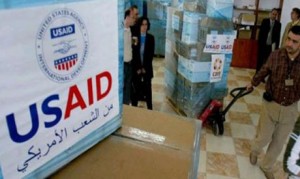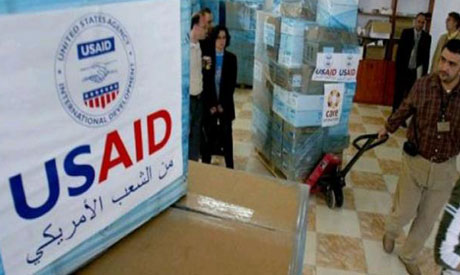
(AFP Photo)
In a recent meeting held with Prime Minister Hesham Qandil, Egypt’s government agreed to accept American aid aimed at helping to fund the country’s new cash transfer program, a part of Egypt’s broader economic reform package. The decision is expected to pass within the next several days.
The agreement, initially signed on 17 March, stipulated that the United States Agency for International Development (USAID) provide Egypt with $190m of the $450m of aid it is expected to receive from the United States.
This would represent the first installment of American aid to Egypt, which would be distributed once the Egyptian government releases official statistics confirming that it is implementing its financial and economic reform package and attempting to reach common ground with the IMF. Last February Egypt’s government presented its revised economic reform package to the IMF, which the latter rejected.
Christian Lagarde, Managing Director of the IMF, stated during a press conference held during the organisation’s spring meeting session that: “The IMF will not leave the negotiating table, and we hope to continue making progress along the lines of that which we have already achieved. It is on us to continue working to provide support to the Egyptian people.”
These statements came as negotiations between the IMF and Egypt’s government have begun to slow down, as the latter failed to provide the requested guarantees to ensure the long term sustainable growth of its economic reform program. These included failure on the part of the government to release official statistics regarding the country’s economy, in addition to Egypt’s continued state of political division, which could threaten to throw the country’s reform package off track.
The agreement stipulated that the remaining $260m be provided to Egypt’s government on the condition that officials provide evidence clarifying that the country has begun to implement austerity measures that meet international standards as stipulated in Egypt’s economic reform program. This would require improved and increased cooperation with international financial institutions such as the IMF.
These measures include the restructuring of Egypt’s energy subsidies program, improving the government’s public financial administration, increasing the country’s floating tax system in a way that would increase the country’s pool of tax payers, and reigning in the amount of tax exemptions granted to citizens.
So far, the government has released a smart card program for 95 octane gasoline set to take effect by August 2013, altering the price to be used for industrial purposes. The government has also promised to gradually eliminate energy subsidies for the country’s factories over a period of 3 years.
The government is currently waiting for Egypt’s Shura Council to approve the country’s pending sales tax law, after the former already approved the country’s stamp and income tax bills. Laws to increase the personal tax exemption limit from EGP 9,000 to EGP 12,000, forbidding the taxation of acquisitions, mergers and dealings, in addition to implementing a 30% tax rate on those whose income exceeds EGP 5m annually, have also been recently passed.
Acceptance of the American aid stipulated that none of the aid be used to fund the import of products, or be used for the payment or recovery of military loans. Instead, according to the agreement, loans should be used to address Egypt’s debt to international financial institutions. Funds to be used for these purposes would be placed in a bank account opened by Egypt’s Central Bank. This account, which would consist only of dollars, would not acquire interest on any monies it possessed. This would be to avoid Egypt’s Public Treasury from acquiring additional funds outside the amount stipulated by the agreement.
Such funds could also be used in the direct recovery of non-military owned debt owed to the United States or secured with its knowledge. This would include the basis of the loan and its interest for all payments made to the United States since July 2011.




